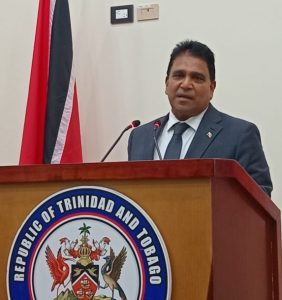By Sue-Ann Wayow
SOME international banks that have been servicing Caribbean clients for decades are now on the verge of pulling out of the Caribbean countries in order not to pay high fines.
And if those issues in the banking sector are not dealt with soon, it may reach to a point where the ordinary person may not be able to cash a cheque.
This was stated by Prime Minister Dr Keith Rowley on Thursday as he spoke about the relationship between international and local banks.
The Prime Minister held a press conference at the VIP Lounge of the Piarco International Airport following his arrival from Barbados.
Dr Rowley who is also the head of CARICOM attended the Roundtable Discussion on De-Risking and Correspondent Banking where he raised key issues with international representatives.
He said it was becoming more difficult to conduct transactions with international banks, problems which began even before the Covid-19 pandemic and was raised by CARICOM.
Dr Rowley said, “Fortunate for us at this time, none of our banks have been seriously affected but if we allow the flow to continue as it is going, it most certainly will put us in a position where others are at the moment so we are trying to head that off.”
The Pm said, “At the moment, it is a very serious threat and the outcome could be far-reaching… The local banks are very nervous.”
He continued, “At the level of the small man, it is that you won’t be able to cash a cheque and you can’t do a transaction. At the level of trade, you could have trade but you can’t do the transaction because you can’t pay bills, or you can’t get money coming into you.”
When asked if there were any US banks that were making arrangements to have establishments in the Caribbean but changed their positions based on current issues, Dr Rowley said he was not aware of any.
However, he said, “What I do know is that, some of those banks that we have had long… decades either have or on the verge of saying the Caribbean is not a place that we want to continue doing business because of the risk climate that exists now.”
Dr Rowley said the foreign banks were either wary of the risks of being identified as banks being involved in money laundering and terrorist financing or the risks of the fines that will come to them if they do business with Caribbean clients.
He said, “We don’t want to be held accountable for things we are not guilty of.”
The Prime Minister added that it was unfair to Caribbean banks to be labelled in a negative light when banks in other countries also engaged in such transactions.
“It is important that we defend our banking system,” Dr Rowley said.
He reiterated statements made during the Roundtable discussion that it was imperative that local banks have a good professional relationship with foreign banks in order to improve efficiency in that sector.
Background
In 2016, a Reuters report stated, “As banks scrub their books of potentially risky businesses amid a tightening regulatory noose, major US financial institutions have ended relationships with regional banks across the Caribbean in the last four years, Caribbean officials and bank executives say.
“This so-called ‘de-risking’ or ‘de-banking’ in which banks pull out of certain lines of business and even parts of the world, has intensified. Enhanced scrutiny on financial fraud and new regulations to stem money laundering and terror finance are all at play.”
A survey in 2017 by the Caribbean Association of Banks found that 21 of the 23 banks in 12 Caribbean countries had lost at least one correspondent banking relationship. The impact was particularly hard on countries in the Eastern Caribbean (in particular Antigua and Barbuda and St Kitts-Nevis), Suriname, and Belize according to a publication by the Centre of Strategic and International Studies (CSIS).
Banks pulling out of the region include the Bank of America, Scotiabank, Royal Bank of Canada, and CIBC. Banks from the Netherlands, Germany and the United Kingdom also restricted their CBR business with Caribbean jurisdictions.
On 7 January 2022, the European Commission adopted a new Delegated Regulation in relation to third countries which have strategic deficiencies in their anti-money laundering (AML)/counter financing of terrorism (CFT) regimes that pose significant threats to the financial system of the Union (‘high-risk third countries’).
Caribbean countries identified as having strategic deficiencies in their AML/CFT regimes include Barbados, Cayman Islands, Haiti, Jamaica and Trinidad and Tobago.
T&T has been listed the longest since March 6, 2018. On October 1, 2020, Barbados entered the list. Cayman Islands, Haiti and Jamaica are the most recent additions, being placed on March 13, 2022.
![]()













